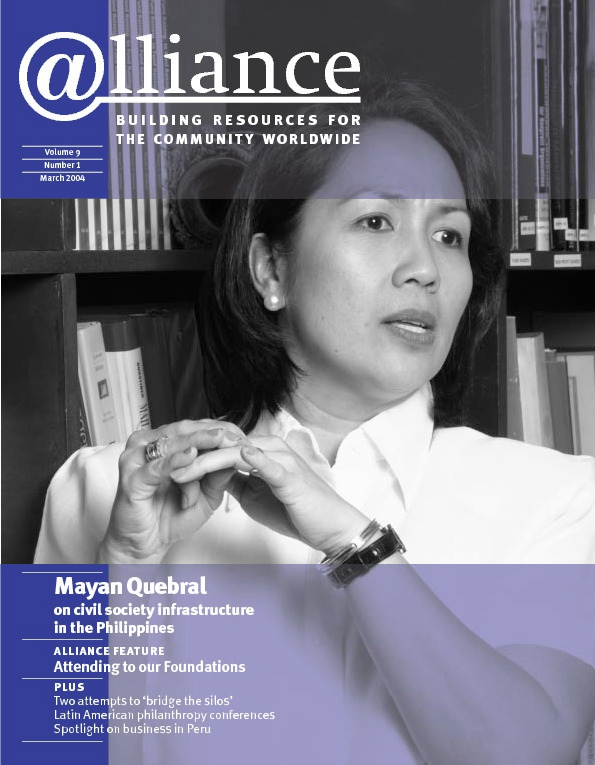As Bulgaria’s accession to the European Union draws nearer, philanthropy is an increasingly debated issue. While more organizations, institutions and companies are involved, there is as yet no agreed cross-sector definition of corporate social responsibility (CSR).
Consumers’ associations talk about the protection of consumers’ rights; trade unions and labour organizations insist on decent labour conditions; business thinks that CSR means compliance with EU legal requirements; business associations are concerned about business ethics and the unfair competition of the grey economy.
The study on attitudes to giving among Bulgarian business commissioned by Bulgarian Charities Aid Foundation (BCAF) in 2005[1] shows that Bulgarian business defines CSR mainly in terms of responsibility to employees (16 per cent) and to a much lower degree as philanthropy (9 per cent) and engagement with important social causes (4 per cent). Philanthropy is the least strategically planned of all CSR activities. Only 6 per cent of the companies surveyed – among which international companies and mixed-venture companies outnumbered Bulgarian ones by four to one – have a strategic view on philanthropy. With EU accession approaching, local companies see community involvement mainly as necessary to conform to EU market standards.
Modern practices emerging
Nevertheless, statistical data show that companies are gradually becoming aware that CSR can be positive for the company: 67 per cent of respondents mentioned at least one positive effect. Mostly they mentioned building a positive image (49 per cent) and sharing common values and goals within the company (39 per cent). It is much rarer for philanthropy to be associated with financial return for the company (12 per cent).
There is definite interest in modern forms of corporate philanthropy. Some companies have established their own foundations. Some of these select a single organization to form a long-term partnership with, while others choose organizations to fund by means of a tendering process. Few companies have a specially appointed person responsible for social programmes.[2]
There has also been an increase in the number of cause-related marketing campaigns,[3] with more than one third of consumers surveyed saying that they would buy a product if the price includes a percentage for charity. Awareness of payroll giving remains modest, however, with just 20 per cent of companies aware of it. Representatives of major companies are again better informed. A number of companies encourage their employees to apply their knowledge and skills to the benefit of schools, residential homes or other charitable organizations.
Public expectations
Bulgarians in general are becoming more aware of the social role of business. The increased number of charity campaigns, the public discussion of tax reforms and the acute shortage of funds in such vital areas as healthcare and culture have all raised public expectations of corporate giving and social responsibility. However, there is little hard information on how consumers in Bulgaria react to the existence or lack of socially responsible behaviour in companies, and the practice of boycotting certain brands or products is still unknown in Bulgaria.
Since the beginning of the 1990s, as external funding decreases, donors to non-profits have started to ask for a local contribution as a condition for providing funding – between 5 and 30 per cent in the different programmes. This seems to be stimulating non-profits to try to involve local businesses – with positive results.
Following devastating floods in parts of Bulgaria earlier this year, for example, a charity campaign managed to raise nearly 4 million BGN from Bulgarian citizens and businesses and a significant amount of aid in the form of services and products for the affected areas.
Directions to follow
Some businesses in Bulgaria are taking on the notion of CSR, and there are examples of good practice to draw on. What is needed now is for business, the media and NGOs to talk to each other, to learn about each others’ roles and responsibilities, and to agree what the proper role of business in the community should be. Nor is this merely a matter for the different ‘sectors’. In refining the idea of CSR, increasing public expectations of corporate behaviour should be taken into account, too.
1 National Representative Study on Philanthropy in Bulgaria among Bulgarian Citizens and Business, commissioned by BCAF, March 2005. See http://www.bcaf.bg
2 This role is sometimes taken on by the Human Resources, Marketing or Public Relations teams.
3 These include imported CRM campaigns such as Avon and the Breast Cancer Campaign, Oriflame and Childhood Foundation, Sheraton and Unicef, TNT and Walk the World Against Hunger. There are some local initiatives as well, mainly in partnership with the Bulgarian Red Cross, a well-known non-profit organization that enjoys public trust.
Kristina Maglova is a Marketing Expert with Bulgarian Charities Aid Foundation. She can be contacted at kristina@bcaf.org






Comments (0)